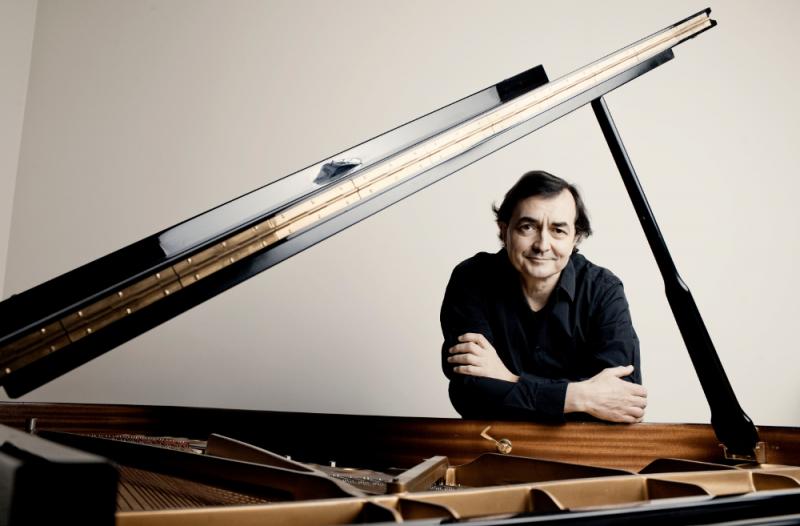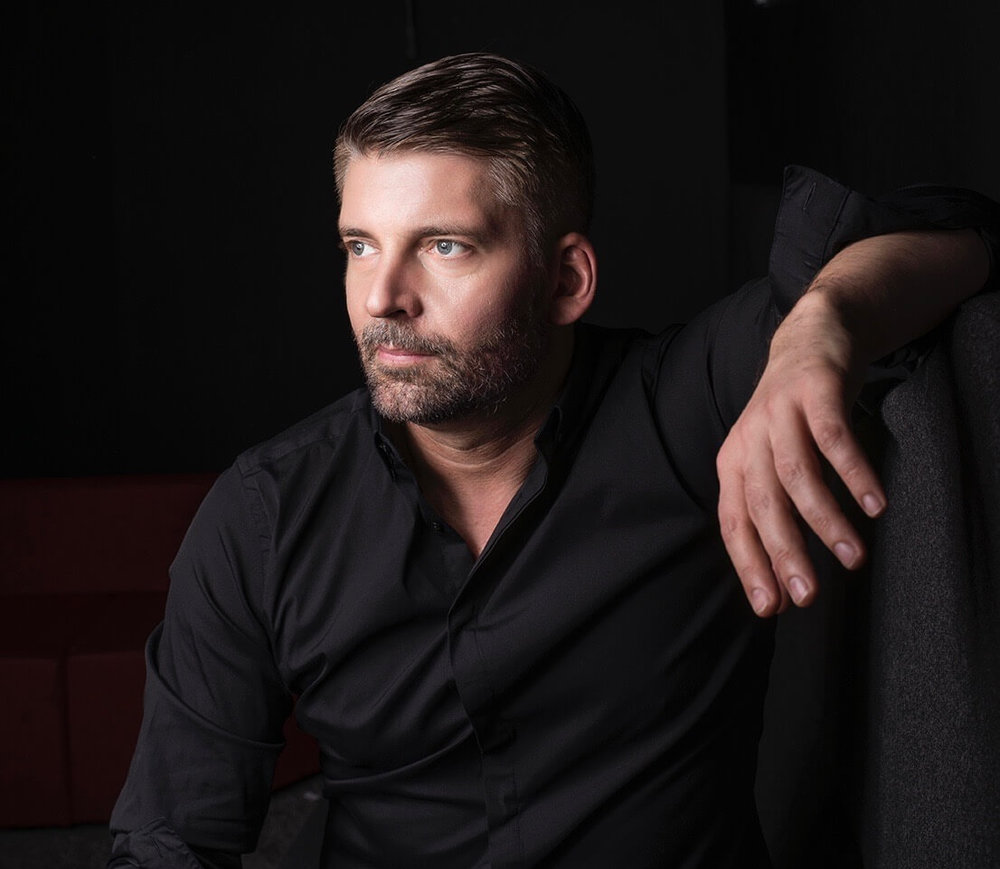Edinburgh Festival 2018 review: Aimard, SCO, Pintscher - psychedelic visions | reviews, news & interviews
Edinburgh Festival 2018 review: Aimard, SCO, Pintscher - psychedelic visions
Edinburgh Festival 2018 review: Aimard, SCO, Pintscher - psychedelic visions
Two dazzling Messiaen performances from the composer's piano protégé

There were two immediate casualties at Pierre-Laurent Aimard’s high-energy account of Messiaen’s monumental Des canyons aux étoiles… with the Scottish Chamber Orchestra at the Edinburgh International Festival.
First was one of the strings in the Usher Hall’s Steinway grand, which finally gave way during the piece’s eighth movement. Well, it had been given really quite a pounding by Aimard, and went on to emit a prepared piano-like buzzing rattle until the end of the piece. Second – less crucially – was the handle of the percussion section’s wind machine, cranked so furiously to conjure Messiaen’s evocations of the US landscape that it thumped to the floor and required careful winding back on.
That’s not to suggest, however, that this was an insensitively brutal, violent performance. It was undeniably forceful, but its remarkable intensity felt entirely put to service in peering beyond the music, reaching far and hard – and sometimes beyond ideas of conventional politeness – to capture glimpses of Messiaen’s psychedelic visions.
And there are plenty of visions (and psychedelia, too) in Messiaen’s 90-minute, kaleidoscopic, mosaic-like meditation on the Utah landscape, its abundant birdlife, the colours of its rocks and its wide-open heavens, and even its calls out into space – to the stars and planets, or to the inhabitants of heaven, or probably both.
Yes, Des canyons is full of Messiaen’s trademark kaleidoscopic mysticism, his chattering cacophonies of birdsong, his idiosyncratic, monumental textures. But it’s also one of his most user-friendly, evocative works – and Aimard and the SCO gave it just the majestic, no-holds-barred performance it needs to truly shine.
Aimard himself attacked Messiaen’s fistfuls of notes with astonishing power, filling the hall especially in the work’s two solo-piano movements. But what was really remarkable was his balance and delicacy, even when firing on all cylinders – voicings in Messiaen’s artificially harmonised birdsong were exquisite, and there was a granitic clarity to the composer’s dazzling harmonies.
But Messiaen being Messiaen, and less never possibly being more, Aimard was joined by three additional soloists. Alec Frank-Gemmill – the SCO’s principal horn as well as a noted soloist in his own right – shone brightly in the work’s horn solos, negotiating Messiaen’s strange extended techniques effortlessly, even if his rubato threatened to rob the composer’s additive rhythms of their off-kilter beauty. Bence Major was an exuberant xylorimba-ist, clattering away with brilliant definition in the relentless birdsong, and Noè Rodrigo Gisbert on glockenspiel made some beautiful subtle, supple contributions to the meditative slow movement, "Les ressuscités et le chant de l’étoile Aldébaran".
 Under composer and conductor Matthias Pintscher (pictured right, photo from Ensemble Intercontemporain), the SCO gave a brilliantly confident, commited account, occasionally a little rough around the edges in terms of ensemble, but full of vigourous enthusiasm nonetheless. Pintscher, too, was naturally responsive to the work’s theatricality, pushing on when things heated up, allowing air and space for Messiaen’s majestic chorales to achieve their full grandeur.
Under composer and conductor Matthias Pintscher (pictured right, photo from Ensemble Intercontemporain), the SCO gave a brilliantly confident, commited account, occasionally a little rough around the edges in terms of ensemble, but full of vigourous enthusiasm nonetheless. Pintscher, too, was naturally responsive to the work’s theatricality, pushing on when things heated up, allowing air and space for Messiaen’s majestic chorales to achieve their full grandeur.
It was a breathtaking experience – one that might not have drawn the festival’s biggest audience. It was an appreciative crowd nonetheless, and even drew on-stage thanks from Pintscher for its attentive listening. For 90 minutes, it felt like a group of strangers had become a community (or maybe a congregation?) to open themselves to Messiaen’s wonders. And wonders were just what they experienced.
Aimard had begun his three-concert International Festival residency the previous Monday, with a wide-ranging, sumptuously perfumed recital blurring boundaries between Scriabin, Debussy, Messiaen, little-known Russian mystic Nikolay Obukhov and – well, Chopin, who felt like the odd man out, but was dispatched with no less conviction for that.
And Aimard finished back at the Queen’s Hall at the end of the week, in a tumultuous two-piano recital with his on- and off-stage partner Tamara Stefanovich that culminated with another Messiaen monument, Visions de l’Amen (well, what else?). Messiaen conceived the work for himself and his own partner Yvonne Loriod to play, reserving the meaty themes and structurally vital stuff for himself, and giving Loriod the frilly, florid birdsong and bell-like cascades of colour harmonies. Well, it was 1943. Aimard and Stefanovich maintained the male/female division of parts – but they delivered a profoundly questioning, at times light-footed account that was a long way from the rugged monumentality of Messiaen and Loriod’s recordings.
The scampering jazzy dance in the fifth movement, "Amen des anges, des saints, du chant des oiseaux", for example, had a wide-eyed naivety, and their "Amen du désir" seemed to summon just that, although there was perhaps a little too much well-behaved self-restraint at its orgasmic climax.
But, as in Des canyons, what really impressed was both players’ sense of balance, blend and voicing, even in the loudest, most extrovert passages: melodic lines shone through, arcane harmonies dazzled like stained-glass windows, thumped bass clusters filled the hall like drums or gongs. The concluding "Amen de la consummation" built the ecstasy ever higher, and the audience leapt to its feet in response.
- The Edinburgh International Festival and Fringe continue until 27 August
- Read more classical reviews on theartsdesk
rating
Explore topics
Share this article
Add comment
The future of Arts Journalism
You can stop theartsdesk.com closing!
We urgently need financing to survive. Our fundraising drive has thus far raised £49,000 but we need to reach £100,000 or we will be forced to close. Please contribute here: https://gofund.me/c3f6033d
And if you can forward this information to anyone who might assist, we’d be grateful.

Subscribe to theartsdesk.com
Thank you for continuing to read our work on theartsdesk.com. For unlimited access to every article in its entirety, including our archive of more than 15,000 pieces, we're asking for £5 per month or £40 per year. We feel it's a very good deal, and hope you do too.
To take a subscription now simply click here.
And if you're looking for that extra gift for a friend or family member, why not treat them to a theartsdesk.com gift subscription?
more Classical music
 First Person: clarinettist Oliver Pashley on the new horizons of The Hermes Experiment's latest album
Compositions by members of this unusual quartet feature for the first time
First Person: clarinettist Oliver Pashley on the new horizons of The Hermes Experiment's latest album
Compositions by members of this unusual quartet feature for the first time
 Gesualdo Passione, Les Arts Florissants, Amala Dior Company, Barbican review - inspired collaboration excavates the music's humanity
At times it was like watching an anarchic religious procession
Gesualdo Passione, Les Arts Florissants, Amala Dior Company, Barbican review - inspired collaboration excavates the music's humanity
At times it was like watching an anarchic religious procession
 Classical CDs: Camels, concrete and cabaret
An influential American composer's 90th birthday box, plus British piano concertos and a father-and-son duo
Classical CDs: Camels, concrete and cabaret
An influential American composer's 90th birthday box, plus British piano concertos and a father-and-son duo
 Cockerham, Manchester Camerata, Sheen, Martin Harris Centre, Manchester review - re-enacting the dawn of modernism
Two UK premieres added to three miniatures from a seminal event of January 1914
Cockerham, Manchester Camerata, Sheen, Martin Harris Centre, Manchester review - re-enacting the dawn of modernism
Two UK premieres added to three miniatures from a seminal event of January 1914
 Kempf, Brno Philharmonic, Davies, Bridgewater Hall, Manchester review - European tradition meets American jazz
Bouncing Czechs enjoy their Gershwin and Brubeck alongside Janáček and Dvořák
Kempf, Brno Philharmonic, Davies, Bridgewater Hall, Manchester review - European tradition meets American jazz
Bouncing Czechs enjoy their Gershwin and Brubeck alongside Janáček and Dvořák
 Solomon, OAE, Butt, QEH review - daft Biblical whitewashing with great choruses
Even a top soprano and mezzo can’t make this Handel paean wholly convincing
Solomon, OAE, Butt, QEH review - daft Biblical whitewashing with great choruses
Even a top soprano and mezzo can’t make this Handel paean wholly convincing
 Two-Piano Gala, Kings Place review - shining constellations
London Piano Festival curators and illustrious friends entertain and enlighten
Two-Piano Gala, Kings Place review - shining constellations
London Piano Festival curators and illustrious friends entertain and enlighten
 Echo Vocal Ensemble, Latto, Union Chapel review - eclectic choral programme garlanded with dance
Beautiful singing at the heart of an imaginative and stylistically varied concert
Echo Vocal Ensemble, Latto, Union Chapel review - eclectic choral programme garlanded with dance
Beautiful singing at the heart of an imaginative and stylistically varied concert
 Scott, Irish Baroque Orchestra, Whelan, RIAM, Dublin review - towards a Mozart masterpiece
Characteristic joy and enlightenment from this team, but a valveless horn brings problems
Scott, Irish Baroque Orchestra, Whelan, RIAM, Dublin review - towards a Mozart masterpiece
Characteristic joy and enlightenment from this team, but a valveless horn brings problems
 Classical CDs: Voice flutes, flugelhorns and froth
Baroque sonatas, English orchestral music and an emotionally-charged vocal recital
Classical CDs: Voice flutes, flugelhorns and froth
Baroque sonatas, English orchestral music and an emotionally-charged vocal recital
 Kanneh-Mason, Britten Sinfonia, Shave, Milton Court - a grin and a big beaming smile
A pair of striking contemporary pieces alongside two old favourites
Kanneh-Mason, Britten Sinfonia, Shave, Milton Court - a grin and a big beaming smile
A pair of striking contemporary pieces alongside two old favourites

Comments
I attended all three of these